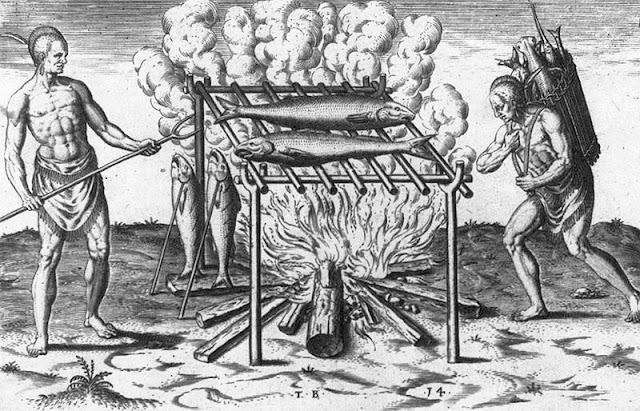THE SCIENCE-PSYCHOLOGY OF PROSPECTION
AND THE MYTH OF PROMETHEUS
The relatively new Science of Prospection is about how human beings "contemplate the future" and that this trait may be the principle difference that "sets us apart from the other animals" according to a recent article in the New York Times."We are misnamed. We call ourselves Homo sapiens, the “wise man,” but ...what makes us wise? What sets us apart from other animals? What best distinguishes our species is an ability that scientists are just beginning to appreciate: We contemplate the future. Our singular foresight [ED: my emphasis] created civilization and sustains society.
"A more apt name for our species would be Homo prospectus, because we thrive by considering our prospects."
We Aren’t Built to Live in the Moment
By Martin E. P. Seligman and John Tierney, May 19, 2017
https://www.nytimes.com/2017/05/19/opinion/sunday/why-the-future-is-always-on-your-mind.html
The central point of the Times article is that "forethought" is what distinguishes humans from other animals. Yet this contemporary cutting-edge concept and its associated science has ancient origins. Furthermore these ancient origins are reflected even in the name of this science.
The prefix pro-, for example, in the word 'prospection', derives originally from the Greek and means today:
"a prefix of priority in space or time having especially a meaning of advancing or projecting forward or outward"
which came from the Latin
"onward in time or space" <Latin: procedere> <English: proceed>
but was derived originally from the Greek
http://www.dictionary.com/browse/pro-
Yet most importantly the name of the Greek god Prometheus, who was the godly benefactor of mankind, meant 'forethought', the prefix pro- being part of his name. So the notion of human nature and "forethought" goes back thousands of years to the myth of Prometheus whose godly life and fate was intertwined with that of us humans.
Word origin of 'Prometheus'
[Greek] Prometheus, lit., forethought <promēthes, thinking before> < pro-, before (see pro) + mathein, to learn (see mathematics)>Collins English Dictionary
https://www.collinsdictionary.com/us/dictionary/english/prometheus
Prometheus stealing fire from the gods to give it to human beings.
While most people know that Prometheus stole fire from the gods and gave it to man, they may not know that according to the Greeks he was the father of mankind, that he made humans from clay. In another telling of the myth he was the godly benefactor of humankind who did not create humans but was given the task of assigning human their animal traits. Because his brother had already given away the best traits to the other animals such as fur, claws and swiftness, Prometheus had to give these naked defenseless animals something to help them survive, so he gave human beings forethought and then taught them all the arts which created civilization.
From the Louvre Museum, Prometheus creates humans as Athena watches. (Roman, 3rd Century CE)
Prometheus Bound by Aeschylus, 5th Century BCE (trans. Weir Smyth)
http://www.theoi.com/Titan/TitanPrometheus.html
Prometheus said "Listen to the miseries that beset mankind--how they were witless before and I made them have sense and endowed them with reason... [They] managed everything without judgment, until I taught them to discern the risings of the stars and their settings, which are difficult to distinguish." [ED: i.e., how to tell time and the timing of the seasons by the stars]
I think it is significant that Prometheus first taught 'primitive' humans about time before he went on to talk about the arts that he taught humans. In other words telling time was a key that opened the door to learning the skills and crafts that created civilization.
Again in Prometheus Bound, Prometheus said (speaking of himself in third person), "-- every art possessed by man comes from Prometheus." This passage indicates that ancient people believed Prometheus instructed humans in all the various arts, crafts and skills that created civilization.
I feel that the connection between these newest scientific findings about the nature of human beings and this western myth that echoes these ideas is important. But when I did a search on Google for "Prospection and Prometheus," I found no article about the relationship.
The myth(s) of Prometheus -- there are actually quite a few stories from various sources, not just one myth -- reach deep into the human psyche (another Greek word, the name of a Greek goddess, now part of the word 'psychology'). I believe these stories might offer clues about our basic nature and assist this new Science of Prospection in its research.
For example, the famous myth about Prometheus stealing fire from the gods and giving it to mankind, has profound implications. Scientists now believe that the use of fire goes back at least 400,000 years and possibly a million years.
https://www.smithsonianmag.com/science-nature/the-earliest-example-of-hominid-fire-171693652/
According to the myth Prometheus not only stole the fire but also showed humans how to keep and tend a fire. In stealing fire from the gods, Prometheus taught humans how to think ahead because starting a fire from scratch, keeping a fire going, cutting wood for the winter, drying the wood -- all took forethought, the skill needed to master time.
"It is also said that Prometheus fancied mankind and, according to Hyginus' Fabulae, he taught them how to keep fire alive when they first got it from the gods."
GREEKGODS.ORG
https://www.greek-gods.org/titans/prometheus.php
Otzi, the discovered neolithic frozen 'iceman' who died 5000 years ago long before the Prometheus myths were written down, carried with him "a little fire-starting kit, and a birchbark container holding embers wrapped in maple leaves" according to National Geographic. The fire starting kit contained flint, pyrites and tinder fungus which indicated a 'flint and steel' way of creating a spark that would be caught in the fine dry fungus and then fanned into a flame.
http://ngm.nationalgeographic.com/2007/07/iceman/hall-text
A modern way to start a fire with a match.
https://www.smithsonianmag.com/science-nature/why-fire-makes-us-human-72989884/
This is especially interesting because in another article in my blog, DeconstructingTime, I documented the connection between tool making and language. I believe that fire can be considered a basic tool which led to the creation of many other tools.
For example, the following website lists many of the different ways that 'primitive' humans used fire for making tools, clearing land, making dugout canoes and bowls, and bending and shaping wood for baskets or bows.
http://www.primitiveways.com/uses_of_fire.html
This drawing from 1590 by Theodor de Bry shows a variety of ways that native American Indians used fire in the felling of trees and the hollowing out of a dugout canoe.
http://deconstructingtime.blogspot.com/2017/02/concept-of-time-embedded-in-language.html
A SCIENTIFIC STUDY ABOUT TOOL-MAKING AND LANGUAGE
A current brain study implies that from the earliest development of speech, language contained an understanding of time. This study looked at regions of the brain that were activated when using language or tool-making and found that the regions were the same. This suggests that time was a crucial component for both language and tool-making because language was needed to conceptualize time and to communicate and coordinate with others. This understanding of time was crucial to tool-making since a tool was made for a specific purpose which required forethought. Making a tool required planning along with a number of skills that needed to be done in a certain order. And then in addition these finished tools needed to be available at the appropriate time such as for a hunt or for a harvest.The study is entitled: Language and tool-making skills evolved at the same time
This study of brain activity has shown that:
"The same brain activity is used for language production and making complex tools, supporting the theory that they evolved at the same time.
"Dr Georg Meyer, from the University Department of Experimental Psychology, said: 'Our study found correlated blood-flow patterns in the first 10 seconds of undertaking both tasks. This suggests that both tasks depend on common brain areas and is consistent with theories that tool-use and language co-evolved and share common processing networks in the brain.'
"Darwin was the first to suggest that tool-use and language may have co-evolved, because they both depend on complex planning [ED: e.g., a complex understanding of time] and the coordination of actions but until now there has been little evidence to support this."
https://www.sciencedaily.com/releases/2013/09/130903102003.htm
This recent study cited above finds that the same areas of the brain are activated when using language or making tools. Since complex tool-making requires considerable thought about tools used to make tools, the use of various materials, and the order of steps in the process, it seems likely that language and its concept of time was an integral part of both making tools and passing that information on to succeeding generations.
Here is a recent article about the steps required to make a bow and arrow in Paleolithic times from the University of Tuebingen as reported by the DailyMail in the UK.
"Researchers from the University of Tuebingen say that...making the bow [ED: in Paleolithic times] took 22 raw materials and three semi-finished goods (binding materials and multi-component glue) as well as five production phases. Further steps were needed to make the complementary arrows, reports the Cambridge Archaeological Journal. Other primates such as chimps are able to use tools, but complex processes such as making bows are beyond them." http://www.dailymail.co.uk/sciencetech/article-2170895/Inventing-bows-arrows-took-early-humans-TWO-MILLION-years.html
This 1590 drawing by John White shows how native American Indians cooked their fish.
CONCLUSION
Fire can be thought of as a basic tool. The gift of fire was believed to have been given to humans by Prometheus, the god of forethought, along with all the arts of civilization. So it appears that the ancient Greeks had a basic understanding of our uniquely human nature and our ability to plan for the future.As I said earlier in this blog, I feel that the connection between the Science of Prospection with this important western myth is significant. I hope that researchers in the field will look into this connection and also look further for other insights that the ancient Greeks may have had about human nature.






No comments:
Post a Comment